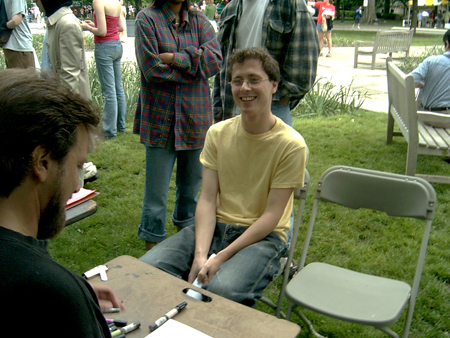Launched by Harvard students February 4 and spreading to more than 30 other schools, Thefacebook, “an online directory that connects people through social networks at colleges,” has finally reached Chicago, turning otherwise industrious undergraduates into social (or, at least, virtually social) beings. Since the system’s programmers added Chicago to its directory April 30, students have hovered over computer screens from Harper to the Reg, fascinated to no end by the new phenomenon. Thefacebook, a virtual directory of classmates’ sexual orientations, hobbies, and schedules, has replaced sticker books or pogs from current undergrads’ younger years.
Anyone with a uchicago.edu e-mail account can sign up for the free service, which links U of C participants both to one another and to friends at other schools. Students can create a list of real-life friends and also make new ones, either by searching for classmates or by scanning clubs, jobs, summer plans, political views, and other categories. Thefacebook also functions as a dating site, where users can announce whether they are seeking men, women, or both, and for what sort of relationship. Once registered, they may upload photos, theoretically but not always of themselves, and attach them to their profiles. Unlike services such as Friendster or Match.com, which, the New York Times reported, students consider “strictly for the older generation,” Thefacebook and another college-geared site, WesMatch, are used “somewhere between procrastination tool and flirtation stimulant.”
“In its first week at the University of Chicago,” the Maroon reported, “thefacebook.com has achieved rapid, widespread popularity among students, with some 1,500 students registering in the first 75 hours. After one week, there are 2,380 students registered at the University, with 118,560 students registered throughout the United States.”
Phoebe Maltz ‘05
Photo: Phoebe scans other Facebook profiles at the Reg (top). Phoebe's own profile (bottom). Photos by Molly Schranz ’05.




















